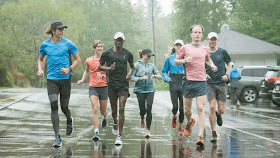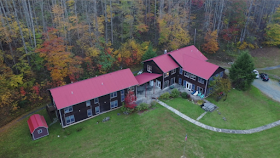(Yes, the title rhymes. In Appalachia we say Appel - latch - uh.)
 |
| It's not goodbye, just see you later |
I'll get the announcement out of the way early: I'm moving to New York City with Joanna!
Fittingly, I'm starting a new life chapter in the same city where the special moment I consider to have opened this past life chapter took place:
In the Fall of 2011, anemia nearly cut the legs out from under my senior cross country season at Princeton. But a ferritin test late in the game prompted me to start taking iron supplements, something I'd never done. Within two weeks, workouts began indicating that something positive was happening with my fitness: I wasn't struggling to hit fast paces anymore. Unfortunately it was too late. I wasn't named to travel with the team to the NCAA championships in Terre Haute; I simply hadn't proven to the coaches I was ready in time. But there was a consolation: the IC4A cross country championships held the same week in Van Cordtland Park, the Bronx. Many northeastern teams that didn't make the national meet as well as the "B" squads from schools that do make NCAA's compete at IC4A's.
Do you know what it feels like to finally have your hard work pay off at the eleventh hour, when it was beginning to look totally futile? I'd spent the summer of 2011 running month's worth of 100+ mile weeks at altitude in Park City, UT, chasing my team mates on tempo and long runs, lungs burning for what I only now know was anemia. I was over trained, and when the season began the results showed it. 25:53 and 26:01 8k performances, about two minutes slower than what I'd run a year earlier. I wasn't even close to making the 12-man Heptagonal (Ivy League) conference team, a hard pill to swallow for a senior.
But the summer training in Utah didn't go away. My blood iron levels on the rise, I was less handicapped. We showed up to IC4A's in New York, and I led Princeton's junior varsity squad to an individual and team win. I ran 24:49 for 8k, not bad on the hills of VCP, with fellow Tigers in a tight group not far behind. Celebrating our win with my team mates after, I felt that a switch had just flipped. I had turned a corner.
On that day I started becoming the runner who would break four minutes in the mile, set school records at Princeton and Texas, and go on to run professionally. On that day, running grabbed hold of me tightly, and it led me all the way through my twenties to now.
Since then, I've spent the better part of decade in pursuit of a simple but evasive quarry: running faster. Living and breathing running at ZAP, sacrificing a "normal" life in the North Carolina Blue Ridge Mountains. Two things from this place are going to leave an everlasting impression on me: the physical landscape and the people.
 |
Here it is rhododendron forest, ancient gray rock heaving at crazy angles out of ridge tops, and mountains that fold and fold to the horizon. If you're running, you're inevitably next to a creek or river, and the steeper the road or trail you're on, the smaller and younger the water. The topography funnels us around here, controls where we go, and sculpts us physically and mentally. I've been profoundly inspired by these ancient mountains.
The people: the team mates and coaches at ZAP who each left their own unique impression on me. A group of runners is a like a cast of cartoon characters: each with strengths and weaknesses that are amplified and caricatured by the demands of our sport. I could write a book about each one of them. Few work-life situations could have developed in me the type of empathy, patience, and love for others that ZAP has.
 |
| The people. |
Having lived in the North Carolina mountains for seven years, Manhattan is going to be quite a lifestyle change. But none of my running goals are modified. I'll still be affiliated with ZAP and On Running, training for next year's Olympic track trials in Eugene, and looking forward to a career in the marathon. In moving to the city and working a job in engineering (hire me!), I'm taking a leap that will force me to radically alter what daily training looks like, and more importantly, provide distraction from running. Which, believe it or not, is a good thing.
I never could quite sit still at ZAP. Pro running is about spending a few hours working really hard, and then chilling for the other 21 hours of the day. The best athletes can turn their brains off and let stress-free recovery take place. I always wanted to be producing: building something, starting a company, climbing a mountain. I alternately fought against and accepted relaxation throughout my entire seven year career at ZAP. I'd tend to categorize activities as either worth my time or a waste of my time, which can become unhealthy. Sometimes your best memories with friends or your clearest ideas come when your time isn't structured.
In New York, I hope to appreciate my free moments more. To make running a release.
I've given full-time running a really good shot. I competed with success at everything from the 1500 to the marathon, lived and trained with 21 other team mates and friends over the years at ZAP, and competed all over the country and world. It was a hell of a good time.
But the thing is, the hard work has not yet paid off.
Here's to knocking it loose at the moment it's really beginning to look futile.
 |
| Really going to miss this place. |
- - - - - - - - - - - - -
Little update on training & racing amidst the pandemic: We somehow managed to sneak two real races in this summer - the WISCO Mile in Milwaukee, where I ran 4:06, and the Music City Distance Carnival in Nashville last weekend, where I ran 13:45 for 5k. Both did a good job with COVID precautions, especially MCDC, which required two negative tests the week of the meet. There is a possibility of competing in a 10,000m next weekend in LA, depending on city health department permissions.
Joanna and I are carrying out our mandatory 14 day quarantine in NYC, having traveled from North Carolina. We bought a cheap treadmill to train on while we're holed up in the apartment, so that's going to be a lot of fun. In all seriousness, I believe it's possible to maintain a high level of training AND good levels of virus precaution. You just have to be willing to do a little extra work and be a little uncomfortable at times. That goes for whatever your passion is: find a way to adapt.
Thanks for reading.
 |
| MCDC 5,000m in Nashville 8/15/2020 |


